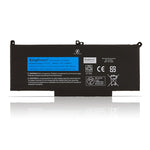您的购物车中没有商品。
How to prevent low temperatures from damaging laptop batteries in winter.

As winter approaches, the cold weather brings us a lot of inconveniences. In addition to wearing thick clothes and using heaters to keep warm, the use of laptops will also be affected. You may not realize that low temperatures have a significant impact on electronic devices, not only affecting battery life, but also causing the computer to run slower and even causing hardware damage.
In order to keep your laptop working properly in winter, it is particularly important to protect your device. This article will tell you how to properly use and maintain your laptop in the cold season.
Avoid exposing your laptop to extreme cold
Don't use the Laptop outside for a long time
Although laptops are designed with portability in mind, they are not designed for extreme cold environments. Cold weather can affect the components inside your computer, especially the battery and hard drive. Cold temperatures can cause the hard drive's mechanical parts to stick, affecting read and write speeds, or even causing the hard drive to fail.
In addition, low temperatures may cause the battery capacity to drop rapidly, and even in extremely cold conditions, the battery may not work properly. To avoid these problems, avoid using the notebook outdoors or in extremely low temperature environments, especially when the temperature is below 0°C.
Avoid sudden changes from cold to warm environments
If you go from a cold outdoor environment to a warm indoor environment, condensation may form on the computer's casing and internal parts due to the temperature difference. In particular, water vapor in the air can condense on the circuit boards inside the laptop, causing short circuits or other hardware failures.
Therefore, after entering a warm environment, it is recommended to place the notebook in a closed environment and wait for it to gradually warm up before using it.
Laptop Battery Management
The temperature is low in winter, and the performance of laptop batteries will decline. Cold environment can easily lead to reduced battery performance, especially lithium batteries, whose discharge efficiency will be greatly reduced at low temperatures.
Keep the battery at a suitable temperature
To prevent excessive battery cooling, avoid leaving your laptop in cold locations, especially in cold weather, and do not leave it in a car or directly next to a window.
Ideally, keep your laptop indoors in a warm environment to ensure that the battery temperature remains within the appropriate range.
Charge frequently
In low temperature conditions, the laptop battery may become unstable due to long periods of non-charging. It is recommended to keep the battery charge between 30% and 80% during winter use. Overcharging or completely draining the battery may affect the battery life.
Do not use the Laptop for a long time while charging
In cold environments, batteries and laptop processors and other hardware tend to generate excessive heat. If you keep your Laptop plugged in when using it in low temperatures, it will increase the burden on the battery and the laptop. Long-term charging can cause the device to overheat and may cause battery damage, so it is best to avoid using it after charging for a long time.
Keep your laptop cool
Although winter is cold, using a Laptop may still generate heat, especially when performing large tasks such as playing games, video editing, or running complex software. If the notebook does not dissipate heat well, overheating may cause device performance degradation, damage, or premature aging.
Clean the heat dissipation vents regularly
The air is drier in winter, and dust is more likely to accumulate inside the computer. Dust will block the heat dissipation vents, resulting in reduced heat dissipation effect of the laptop. Therefore, it is very important to clean the fan and heat dissipation vents of the laptop regularly. You can use special cleaning tools or air blowers to remove dust to ensure normal heat dissipation of the Laptop.
Use a cooling pad
If you often use your computer to handle high-load tasks, you can consider purchasing a cooling pad to assist in heat dissipation. A cooling pad can not only prevent the computer from overheating and performance degradation, but also help the computer maintain its service life for a longer period of time.
Keep the Laptop surface dry
In winter, the temperature difference between indoor and outdoor is large, and moisture may condense on the outer shell of the notebook, especially when you enter the room from outside, water vapor may appear on the surface of the notebook. If this situation is not cleaned up in time, the water vapor may penetrate into the notebook and damage the hardware.
Wipe regularly
In cold winter, especially when the weather is humid, you should wipe the surface of the laptop regularly to prevent moisture accumulation. Use a clean, soft cloth to wipe and avoid scratching the surface of the computer.
Keep the environment dry
If possible, use a dehumidifier to keep the surrounding environment dry. In a humid environment, the laptop is more susceptible to moisture, which will not only affect the life of the battery, but also accelerate the aging of the hardware.
Avoid performance issues caused by excessive low temperatures
In extremely cold weather, the laptop's hard drive, CPU and other components may become unstable due to low temperatures. Especially for mechanical hard drives, low temperatures can cause their mechanical parts to operate poorly, causing the computer to run slowly or freeze.
Hard disk access delay
If you are using a mechanical hard disk (HDD), the access speed of the hard disk may be slow in cold environments, or even the head may not work properly. It is recommended to avoid running the notebook for a long time in low temperatures, especially when reading and writing a large amount of data.
Extended startup time
In a low temperature environment, the computer's startup speed may be delayed, especially in laptops using solid-state drives (SSDs). Low temperatures may cause the battery power to decrease and the startup response to be slower.
Therefore, it is best to start the computer in a warmer environment and allow it to gradually adapt to the temperature before starting it.
Back up important data regularly
Although cold weather can have a negative impact on computer hardware, unexpected battery damage or hard drive failure can also lead to data loss. In order to avoid losing important files, it is a very wise practice to back up regularly.
Cloud backup: You can use cloud storage services, such as Quark Cloud Drive, OneDrive, etc., to upload important files regularly.
External Hard Drive Backup: Backing up your files to an external hard drive regularly is also a good option.
Use automatic backup tools: Set up automatic system backup to avoid forgetting to manually back up important data.
When using a laptop in winter, in addition to avoiding the potential effects of extreme cold, it is also important to keep the computer at a suitable temperature, clean the cooling system, and pay attention to battery management. Proper protection of your device can not only ensure that it operates normally in winter, but also extend its service life.
Hopefully, these tips will help you use your laptop smoothly during the cold weather while also protecting your data and device.
If this article still doesn't help your laptop battery, you can buy a new battery at BatteryMall.com
If you want to learn more about batteries, please visit: BatteryMall.com/blogs/support








